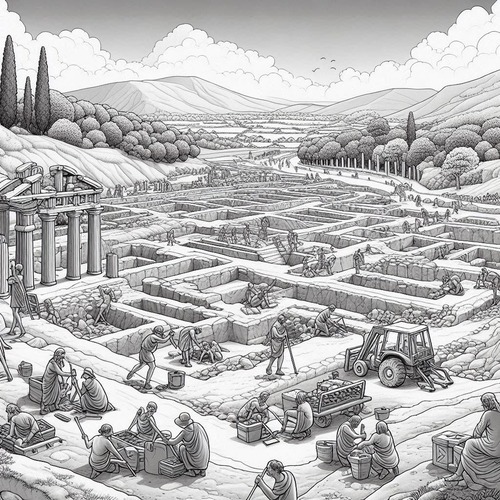Fact Vs. Fiction: Did Rain Exist Before Noah’s Time?
We’ve all heard this claim at some point, and perhaps, have wondered what to make of it: that it never rained on Earth until the time of Noah’s flood. The fascinating notion suggests the first raindrops humanity ever experienced came alongside the most catastrophic deluge in biblical history. But is this interpretation accurate? Let’s examine what both Scripture and science have to say about this intriguing question.
THE CASE FOR NO RAIN BEFORE NOAH
Biblical Arguments
Those who believe rain began with Noah often point to several key biblical passages. Genesis 2:5-6 states: “…for the LORD God had not caused it to rain upon the earth, and there was not a man to till the ground. But there went up a mist from the earth, and watered the whole face of the ground.”
This passage describes the early creation period when a mist or streams watered the earth instead of rain. Proponents argue this water system continued until Noah’s time.
Another compelling argument comes from God’s covenant with Noah after the flood. In Genesis 9:13-16, God establishes the rainbow as a sign of His promise never to flood the earth again. If rainbows (which require rainfall) existed before the flood, why would God present the rainbow as a new covenant sign?
Finally, some suggest the pre-flood world’s disbelief of Noah’s warnings makes more sense if they’d never experienced rain. How could Noah convince people of a coming catastrophic rainfall if they had no concept of what rain even was?
Scientific Considerations
Some creation scientists have proposed a “vapour canopy” theory, suggesting a water vapour layer surrounded the pre-flood earth, creating greenhouse-like conditions. This hypothetical vapour canopy would have created a different hydrological cycle that didn’t require rainfall as we know it.
Under this model, the “mist” mentioned in Genesis could have provided adequate moisture for plant life through heavy dew and ground-watered irrigation. The collapse of this vapour canopy could have contributed to the 40 days and nights of rain during Noah’s flood.
THE CASE FOR RAIN BEFORE NOAH
Biblical Arguments
While the “no rain before Noah” view has some scriptural support, there are even stronger biblical arguments for rain’s existence from creation onward.
- The Genesis 2:5-6 passage specifically describes conditions before human beings were created and plants were cultivated. It doesn’t make a sweeping statement about the absence of rain throughout the pre-flood world.
- Genesis 4 describes Cain as “a tiller of the ground” whose agricultural lifestyle would have been nearly impossible without regular rainfall. The text gives no indication that farming methods were dramatically different before the flood.
- The rainbow covenant doesn’t necessarily mean rainbows never existed before—only that God was now assigning special meaning to this natural phenomenon. Many biblical covenants use existing elements (like bread and wine) as symbols rather than creating entirely new things.
Scientific Evidence
The evidence for rainfall throughout Earth’s pre-flood history is compelling. Geological formations show clear signs of rainfall erosion patterns distinct from flood deposits. Even within the biblical timeline of approximately 6,000 years, the rock layers formed during the creation week and pre-flood world contain preserved raindrop impressions in hardened mud surfaces. These formations, created during the 1,600-odd years between creation and Noah’s flood, demonstrate normal precipitation occurred well before the deluge described in Genesis 7.
The physics of Earth’s atmosphere makes a long-term absence of rainfall virtually impossible. The water cycle—evaporation, condensation, and precipitation—is fundamental to our planet’s climate system. Without rainfall, Earth’s ecosystem as we know it could not function or support diverse life forms.
The “vapour canopy” theory faces insurmountable scientific problems. Any water vapour thick enough to prevent rain would have created crushing atmospheric pressure and temperatures too hot for life. Additionally, converting such a vapour layer into rainfall would have released enough heat to boil Earth’s oceans.
FINDING BALANCE IN THE TEXT
When we examine the original Hebrew terms in Genesis, we find the “mist” in Genesis 2:5-6 may be better translated as “streams” or “flow of water.” The passage is likely describing localised irrigation in a specific region rather than global atmospheric conditions.
We must also consider the purpose of Genesis as literature. The creation account wasn’t written to provide technical meteorological information but to establish theological truths about God’s relationship with creation. Reading modern scientific questions into ancient texts often leads to misinterpretation.
Ancient Hebrew readers would have understood these passages within their cultural context, without our modern atmospheric science questions in mind. They observed rain regularly and would likely have been puzzled by interpretations suggesting rain began only with Noah.
CONCLUSION: DID RAIN EXIST BEFORE NOAH’S TIME?
While the idea of “no rain before Noah” makes for an interesting theological discussion, there’s no compelling reason from Scripture or science to believe rainfall began only with the flood. The biblical passages cited don’t clearly state that rain never occurred before Noah, and scientific evidence strongly indicates rainfall has been part of Earth’s systems throughout its history.
The Bible’s message centres on God’s relationship with humanity and creation—not on providing detailed meteorological history. Both science and a careful reading of Scripture lead to the same conclusion: the rains that fell during Noah’s flood weren’t Earth’s first rainfall, but rather an unprecedented deluge of judgement. And ultimately, indeed, of renewal.
DID RAIN EXIST BEFORE NOAH’S TIME? RELATED FAQs
Did people in Noah’s time really not understand what rain was? There’s no biblical evidence that pre-flood people were unfamiliar with rain. Scripture never suggests Noah had to explain the concept of rain to his contemporaries. Their disbelief likely stemmed from doubting the possibility of a catastrophic flood, not from ignorance about rainfall itself.
- What does the “firmament” in Genesis have to do with the pre-flood water cycle? The “firmament” (Hebrew: raqia) described in Genesis 1 refers to the visible sky or expanse between waters above and below. While some interpret this as supporting a vapour canopy theory, most biblical scholars understand it as ancient phenomenological language describing the visible sky and clouds, not a special pre-flood atmospheric structure.
- If the rainbow appeared after the flood, doesn’t that prove rain was new? Not necessarily. God often assigns new meaning to existing phenomena when establishing covenants. The rainbow was likely a natural optical phenomenon that existed before the flood but was given special covenant significance afterward. This parallels other biblical symbols that existed before being assigned sacred meaning.
How would plants have survived without rainfall before Noah? The Bible never claims plants survived without rain throughout the pre-flood era. Genesis 2:5-6 only describes conditions before plants were created and before humans could cultivate them. The subsequent verses show God creating an environment capable of sustaining plant life, which would naturally include rain.
- What did early church fathers and Jewish scholars believe about rain before Noah? Most early Christian and Jewish commentators assumed rain existed before the flood. Early rabbinic literature and patristic writings generally interpret Genesis 2:5-6 as describing a temporary condition during creation week, not a permanent state lasting until Noah’s time. Their interpretations align with a normal reading of the text.
- Could the pre-flood world have had a different water cycle than we have today? While the Bible doesn’t rule out some differences in the pre-flood environment, any water cycle would have required some form of precipitation. Basic physics dictates that water evaporates, forms clouds, and returns to earth. Even with potentially different atmospheric conditions, something resembling rain would have been necessary.
Is there geological evidence specifically from the time between Creation and the Flood that shows rainfall? Yes, creation scientists have identified what they consider pre-flood sedimentary layers containing rain prints, erosion channels, and other water-flow evidence that differs from flood catastrophism patterns. These formations show natural rainfall processes were active during the approximately 1,600 years between Adam and Noah according to biblical chronology.
DID RAIN EXIST BEFORE NOAH’S TIME? OUR RELATED POSTS
Editor's Pick

Should We Stop Using Male Pronouns for God? Why Do We Say No?
A friend of ours arrived eagerly at his first theology class in seminary. But he quickly discovered something troubling: the [...]

Did Old Testament Law Force Women to Marry their Rapists?
**Editor’s Note: This post is part of our series, ‘Satan’s Lies: Common Deceptions in the Church Today’… Viral misinformation abounds [...]

From Danvers To Nashville: Two Statements, One Biblical Vision
30 years separate the Danvers Statement on Biblical Manhood and Womanhood (1987) and the Nashville Statement on Human Sexuality (2017). [...]

The Nashville Statement: Why Affirm It Despite Media Backlash?
WHY DO REFORMED CHRISTIANS STAND BY THIS STATEMENT ON MARRIAGE AND GENDER? When the Nashville Statement was released in 2017, [...]

Who Is Belial? Solving The 2 Corinthians 6:15 Mystery
Belial: This name from the pages of Scripture chills the soul. Who is this mysterious figure Paul invokes in 2 [...]

Celibacy Or Castration: What Jesus Really Means in Matthew 19:12
One of Scripture's most shocking misinterpretations led theologian Origen to castrate himself in the third century. His tragic mistake? Taking [...]

Philippians 4:13: Did Paul Really Mean We Can Do ALL Things?
"I can do all things through Christ who strengthens me." It's on gym walls, graduation cards, and motivational posters everywhere. [...]

The Ordinary Means of Grace: Why Are They Indispensable?
ORDINARY MEANS FOR EXTRAORDINARY TRANSFORMATION What if God's most powerful work in believers' lives happens through the most ordinary activities? [...]

Is the Bible God’s Word? Or Does It Only Contain God’s Word?
The authority of Scripture stands at the crossroads of modern Christianity. While some argue the Bible merely contains God’s Word [...]

Will We Remember This Life in Heaven? What Isaiah 65:17 Means
"Will I remember my spouse in heaven? My children? Will the joy we shared on earth matter in eternity?" These [...]
SUPPORT US:
Feel the Holy Spirit's gentle nudge to partner with us?
Donate Online:
Account Name: TRUTHS TO DIE FOR FOUNDATION
Account Number: 10243565459
Bank IFSC: IDFB0043391
Bank Name: IDFC FIRST BANK






